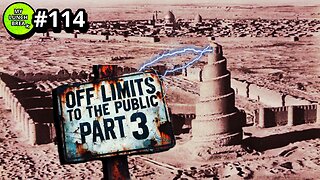Premium Only Content

Letting Kids Grow: From Bonsai to Wildflowers
This is a powerful and insightful perspective on parenting and child development. Let me break down the key ideas and provide some analysis:
1. The Bonsai Tree Analogy:
Initially, the speaker viewed their children as bonsai trees - carefully controlled and shaped to fit a preconceived notion of perfection. This represents a highly interventionist parenting style, where parents meticulously manage every aspect of their children's lives to achieve specific outcomes (in this case, admission to elite colleges).
2. The Shift to Wildflowers:
The speaker's realization that their children are actually "wildflowers of an unknown genus and species" is a beautiful metaphor. It acknowledges that children have their own unique potential and path, which may not be predictable or controllable by parents.
3. Parental Role Redefined:
Instead of shaping and controlling, the speaker now sees their role as:
- Providing a nourishing environment
- Strengthening children through responsibilities (chores)
- Giving and teaching love
4. Autonomy and Self-Determination:
The statement "the college, the major, the career - that's up to them" shows a shift towards respecting the child's autonomy and right to self-determination. This approach aligns with research suggesting that intrinsic motivation and personal choice lead to better outcomes and satisfaction in life.
5. Supporting vs. Directing:
The final line, "My job is not to make them become what I would have them become but to support them in becoming their glorious selves," encapsulates a profound shift in parenting philosophy. It moves from a directive, outcome-focused approach to a supportive, process-oriented one.
This perspective aligns with modern child development theories that emphasize the importance of fostering intrinsic motivation, resilience, and self-discovery in children.
It also touches on the concept of "good enough" parenting, which suggests that perfect control is neither possible nor desirable in child-rearing.
The wildflower metaphor is particularly apt because it implies that, like wildflowers, children:
- Have their own innate beauty and worth
- Thrive best in conditions suited to their nature
- May surprise us with unexpected growth and blooming
- Contribute to a diverse and rich "ecosystem" when allowed to grow naturally
This approach can be challenging for parents, especially in competitive societies where there's pressure for children to achieve specific benchmarks.
However, it potentially leads to more well-adjusted, authentic, and ultimately successful individuals.
If you'd like to elaborate on any particular aspect of this parenting philosophy or its potential impacts feel free to leave a comment below. I'd love to share this topic with you.
Founder and Parent
mybluegenes.com
-
 27:57
27:57
MYLUNCHBREAK CHANNEL PAGE
14 hours agoOff Limits to the Public - Pt 3
61.9K53 -
 38:07
38:07
Michael Franzese
7 hours agoLeaving Organized Crime and Uncovering Mob in Politics: Tudor Dixon and Michael Franzese
49.5K13 -
 2:42:54
2:42:54
Jewels Jones Live ®
2 days agoAMERICA IS BACK | A Political Rendezvous - Ep. 111
46.2K41 -
 8:47:33
8:47:33
Due Dissidence
1 day agoLIVE: Workers Strike Back Conference ft. Chris Hedges, Jill Stein, Kshama Sawant, and More!
88.1K53 -
 8:36:37
8:36:37
Right Side Broadcasting Network
5 days agoLIVE REPLAY: CPAC 2025 Day Three with President Donald J. Trump - 2/22/25
407K94 -
 1:05:34
1:05:34
The Big Mig™
15 hours agoConfirmed Kash Patel New FBI Director, Bring On The Pain |EP483
88.9K27 -
 53:59
53:59
Tactical Advisor
11 hours agoThe Vault Room Podcast 009 | Everyone Getting $5000?!
72K11 -
 2:04:44
2:04:44
TheAlecLaceShow
22 hours agoLive at CPAC | Interviews with Dean Cain, Rep. Comer and more! | The Alec Lace Show
80.9K4 -
 LIVE
LIVE
Major League Fishing
3 days agoLIVE Tackle Warehouse Invitationals, Stop 1, Day 2
370 watching -
 3:12:37
3:12:37
I_Came_With_Fire_Podcast
19 hours agoNOC Spy: CIA uses SATANIC RITUAL ABUSE to make SLEEPER Cells
87.5K20